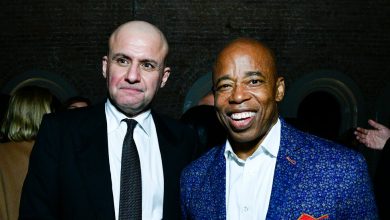Council Likely to Ban Weight Bias in the Workplace

Good morning. It’s Monday. We’ll find out about a bill that could keep people from being fired in New York because they are overweight. We’ll also see why 30,000 places in the city’s pre-K and 3-K programs are empty this year.

Shaun Abreu, the city councilman who introduced the bill, said people treated him differently after he gained 40 pounds.Credit…Brittainy Newman for The New York Times
The headline on a story last week wasted no words: You can be fired for being overweight. The story said you might not even get hired: Victoria Abraham, who graduated from New York University last year and is a self-described fat activist, said she wondered if her size would affect her job hunt.
There’s momentum to treat weight discrimination the way other forms of discrimination are treated. The City Council is expected to approve a bill that would ban weight discrimination in hiring, housing and access to public accommodations. The bill has the support of a majority of the Council, with 34 of its 51 members co-sponsoring it, and could be approved as soon as next month. I asked Emma G. Fitzsimmons, our City Hall bureau chief, to discuss what prompted the bill.
This is partly pandemic-related, isn’t it?
The pandemic has put more attention on obesity after many people gained weight while stuck at home. Shaun Abreu, the New York City councilman who introduced the bill, said that he gained 40 pounds and noticed that people treated him differently, touching his stomach and commenting on his weight. But the number of Americans who are obese has been growing for some time and is now at more than 40 percent.
There’s also been some pushback. What do opponents of the bill say?
The leader of the city’s major business group is concerned that the weight discrimination bill could prompt more lawsuits, and that could be difficult for employers. And Joseph Borelli, the Republican minority leader of the City Council, opposes the bill and believes that the areas where people can claim discrimination, like for race and gender issues, should be extremely limited.
Mayor Eric Adams published a book a couple of years ago about losing 35 pounds on a plant-based diet and says he mostly follows a vegan diet now. What’s his position on this bill? What about the City Council speaker, Adrienne Adams?
The mayor is a fitness enthusiast, and he’s always talking about his healthy smoothies and workout routine. I asked him about the bill last week, and he was supportive but said he’s still reviewing the details and the potential impact.
I asked him if he had faced discrimination when he was heavier, and he said no, joking that he was always good-looking.
The City Council speaker sent me a supportive statement about the bill, but she has not said definitively whether she will vote for it or when she might schedule a vote on it.
In terms of present law, isn’t weight discrimination hard to prove because it can be implicit?
There really are no protections for weight-based discrimination on the federal level, though some states and cities have approved measures to prohibit it. An employer could say that they won’t hire someone because they’re too heavy or could fire them for gaining weight. But often, this type of discrimination is unspoken and based on stereotypes about overweight people, and that is more difficult to regulate.
A weight discrimination bill is also under discussion at the state level. Who supports that measure, and what prompted it?
State Senator Brad Hoylman-Sigal of Manhattan is sponsoring the state bill, and it also has support from the powerful Retail, Wholesale & Department Store Union. It was prompted by similar concerns over discrimination against overweight New Yorkers. Hoylman-Sigal also said that he was concerned about the messages about body image that his daughter was seeing on the social media app TikTok.
Weather
Expect a sunny day with temperatures reaching the low 60s. The evening is mostly clear, with temps dropping to the high 40s.
ALTERNATE-SIDE PARKING
In effect until Wednesday (the seventh day of Passover).
The latest New York news
-
Shorter life span after Covid: In 2020, the first year of the coronavirus pandemic, life expectancy in New York City dropped by 4.6 years compared with 2019, according to newly released data.
-
Iranian kidnapping: Niloufar Bahadorifar was sentenced to four years in prison for her unwitting role in the kidnapping of an Iranian-born journalist who fled Tehran in 2009 and had been living in New York City.
-
Restless search: Hired afterTV appearances or brief phone calls,lawyers for former President Donald Trump tend to come and go.
Empty seats for pre-K and 3-K
New York City has 130,000 places for 3- and 4-year-olds in its pre-K and 3-K programs, but only 100,000 students. Some 30,000 spots are empty, and several areas with the highest rates of vacant seats are among the city’s poorest, among them Brownsville, Brooklyn; East Harlem; and several neighborhoods in the southwest Bronx.
My colleague Troy Closson, writing with Raúl Vilchis, says that one possible reason there are so many empty seats is a decline in the number of children in the city. But elected officials and preschool leaders say the gaps would be less dramatic if officials had done more to find and encourage the parents of eligible children to apply.
By some measures, the program’s enrollment looks promising: More than 42,000 New York City children have applied for 3-K in the coming school year, an all-time high. Still, even if every applicant is offered a spot, roughly a quarter of the seats would still go unfilled.
And only 54,000 4-year-olds applied for pre-K, a slight increase over last year but still far below prepandemic enrollment, which hovered around 70,000.
Early childhood advocates say another intensive push modeled on the first, successful outreach campaign in 2014 is needed to fill more seats. Otherwise, a central mission of the pre-K and 3-K initiatives — to serve the high-needs families who stand to benefit most from early childhood education — could be jeopardized.
Education officials say they have sent robocalls and emails to roughly 100,000 families with reminders and targeted information, and directly called nearly 7,600 parents. They have also advertised in several languages on social media, on the subway and at businesses in low-turnout areas, as well as answering questions at local events and information sessions.
But the department no longer does frequent, on-the-ground canvassing. That is a contrast to the push that accompanied the rollout of the program for 4-year-olds in 2014, when, among other things, outreach workers went door-to-door in public housing complexes.
Now, said Lincoln Restler, a city councilman who represents parts of northern Brooklyn, “I feel that we are failing at outreach.”
“If we are not engaging immigrant families, marginalized communities and bringing them in,” he said, “we will continue to not achieve the maximum enrollment we need.”
The empty seats in 3-K could reflect the city’s declining birthrate. Children born in 2020 are eligible for 3-K this year, but new data shows that the birthrate fell by nearly 9 percent between 2019 and 2020, reaching a historic low.
Some 200,000 preschool-aged children lived in the city in 2020, state data shows, about 6 percent fewer than when Mayor Bill de Blasio introduced “3-K For All” in 2017. Some neighborhoods with empty seats, such as Washington Heights, have seen large drops in the number of residents under 18, according to an analysis of census data.
This year, the city hired the consulting company Accenture to determine where seats should be added or removed. In addition to poorer neighborhoods, vacancy rates are also high in several affluent neighborhoods, where more parents may be able to afford private options.
But some elected officials maintain the problem is bigger than demographics alone.
“So many working parents depend on 3-K,” said Shekar Krishnan, a councilman who represents Jackson Heights and Elmhurst in Queens. “It just logically doesn’t seem possible that the vacancies cannot be filled.”
METROPOLITAN diary
Frigid morning
Dear Diary:
It was a particularly frigid morning, with temperatures in the teens and a wind chill that made it feel even colder.
I was in the process of getting a Citi Bike out of a dock at East 39th Street and Lexington Avenue when I heard a woman who was passing by mumble something. It took me a moment to realize she was talking to me.
“Excuse me, sir,” she repeated.
I looked up from the bike to meet the eyes of a short, older woman in a puffy black coat. Her oversize, fur-lined hood was sitting limply against her shoulders.
“Would you mind lifting my hood up over my head?” she asked. “I can’t reach it when I’m all bundled like this.”
I set the bike down.
“Of course!” I said.
I lifted the hood gently over her head until she was fully cocooned.
“Thank you,” she said as she shuffled away.
“Stay warm,” I said as I pulled away from the bike dock.
“I’m trying!” she replied from beneath her layers.
— Yossi Hoffman
Illustrated by Agnes Lee. Send submissions here and read more Metropolitan Diary here.
Glad we could get together here. See you tomorrow. — J.B.
P.S. Here’s today’s Mini Crossword and Spelling Bee. You can find all our puzzles here.
Hannah Fidelman and Ed Shanahan contributed to New York Today. You can reach the team at [email protected].
.




